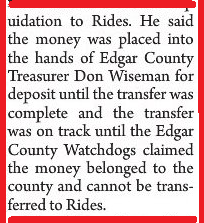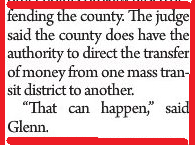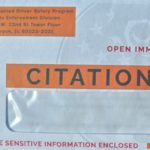CHARLESTON, IL. (ECWd) –
We will cover several issues in this article, starting with what was reported in the local paper:
 Prairie Press (PP): “. . . [Plaintiff’s attorney said] and the transfer was on track until the Edgar County Watchdogs claimed the money belonged to the county and cannot be transferred to RIDES. . .”
Prairie Press (PP): “. . . [Plaintiff’s attorney said] and the transfer was on track until the Edgar County Watchdogs claimed the money belonged to the county and cannot be transferred to RIDES. . .”
TRANSCRIPT (page 15): “. . . all of a sudden it’s some time in 2015 counsel for RIDES received either a letter or an email saying that there might be some issues with appropriating those funds due to knowledge that was brought to them by a local watchdog group. . .”
ECWd: While we appreciate being named, by name, but the fact is the attorney for RIDES did not mention us by name in the court records as was reported by the PP. Yes, we were the ones that brought it to the county board’s attention, however, contrary to the RIDES attorney’s insinuation, we did not bring the issue up in 2015, we brought it up during county board meetings in 2013, 2014, 2015, and 2016.
As a matter of fact, the Director of RIDES was at the meeting on June 17, 2013, when we brought the issue of disposition of the remaining funds to the county board (see approx. 2:45 in this video). We quoted the statute and where it directed the remaining funds to go – so RIDES knew all along we opposed this.
 PP: “. . .the Judge said the county does have the authority to direct the transfer of money from one mass transit district to another.” – “”That can happen,” said Glenn. . .”
PP: “. . .the Judge said the county does have the authority to direct the transfer of money from one mass transit district to another.” – “”That can happen,” said Glenn. . .”
TRANSCRIPT (pages 20 and 21): the above language reported by the PP is not what is in the transcript. “In this court’s view, the county does have authority to adopt a resolution directing the county treasurer to transfer moneys from a dissolved mass transit district to a successor mass—mass transit district”. Additional qualifying language from the court was conveniently left out of the PP reporting, like “There does have to be a legitimate purpose for exercising that authority but I do find that it is, AND BASED ON THE AUTHORITY THAT’S BEEN SUBMITTED, within the county’s power to do so. . .”
ECWd: (we will have to agree to disagree with his statement) Judge Glenn qualified his statement by stating it could be done “based on the authority that’s been submitted” – meaning based on the papers in front of him at the time. He also said “that can happen“, but qualified it with “but for proper purpose” – which he later stated was never in the complaint or the resolution. In granting Edgar County’s motion to dismiss, Judge Glenn said RIDES did not sufficiently set forth the offer, acceptance, and consideration. The county’s resolution was not an offer. The Plaintiff’s resolution was not the acceptance of an offer. Based on the circumstances, there is an inadequate showing of consideration (a requirement for a contract under the Intergovernmental Cooperation Act Section 5).
Use of qualifying language drastically changes the meaning of the words, and in this case, drastically changes the perception of readers as to whether or not the county should keep the remaining funds or give them to RIDES. We stand by our first opinion stated in 2013.
ECWd’s opinion on the remainder of the complaint:
Another issue: RIDES’ reliance on the Downstate Public Transportation Act as giving them the authority to receive money from local governments. Read the Act, it is a short one, and it will become clear to the reader that the Act does not apply to this situation.
- Section 4-1.7 does not include “county” as a participant.
- Section 4-1.6 makes it clear this section refers to “UMTA Section 9” grant funds
- RIDES cited Section 2-15(b) – which according to their text should have been labeled 2-17
- Section 2-17(a) and (b) only applies to “a County or Counties” that provide public transportation in such county or counties. Another requirement is to file 3 copies of any public transportation agreement with County Clerk and the Illinois Commerce Commission and must thereafter comply with “An Act concerning public utilities”. The language RIDES points to only applies to counties who operate their own public transportation and have complied with the Illinois Commerce Commission rules found in Section 2-17(a). Edgar County and Clark County do not operate their own public transportation. (RIDES operates it under their Mass Transit District)
RIDES cites Section 4 of the Intergovernmental Cooperation Act –
- Section 4 only applies to administrative joint boards or other legal or administrative entity created to operate the joint or cooperative undertaking – something RIDES does not meet the definition of since it is its own “unit of local government”. This section was clearly meant for entities like the Illinois Municipal Electric Agency (IMEA) which is truly a “joint or cooperative” board – or more local to Edgar County, the Paris Cooperative High School, another truly “joint or cooperative” board.
RIDES says Section 5 of the Intergovernmental Cooperation Act gives the county the authority (IT DOES NOT):
- A requirement of using Section 5 as authority include the mandated provision that any contract shall set forth fully the purposes, powers, rights, objectives, and responsibilities of the contracting parties”.
- Edgar County Ordinance and Resolution do not meet these requirements as pointed out by the Judge.
- The Edgar Resolution states that it is effective when such resolution and ordinance is approved by 2/3 vote of RIDES Board.
- RIDES never passed any resolution related to receipt of funds or related to any agreement or contract with Edgar or Clark Counties, they only passed a resolution “annexing” Edgar County and one “annexing” Clark County.
- RIDES could not legally annex Edgar County because Clark County never passed an Ordinance dissolving East Central Illinois Mass Transit District, leaving Edgar County legally not contiguous with RIDES. Annexing into a Mass Transit District requires the county be contiguous with the District.
Section 9 of the ICA tells how Counties can contract and participate in intergovernmental agreements. The Resolution was not a contract or intergovernmental agreement, and even if it was, the Resolution did not comply with Section 9 because RIDES did not have the authority to perform the action since Clark County never officially passed an ordinance to dissolve ECIMTD.
1-11-17-RIDES-v-EC
.
Please consider a donation to the Edgar County Watchdogs.
[wp_eStore_donate id=1]







No Comments
Sorry, the comment form is closed at this time.